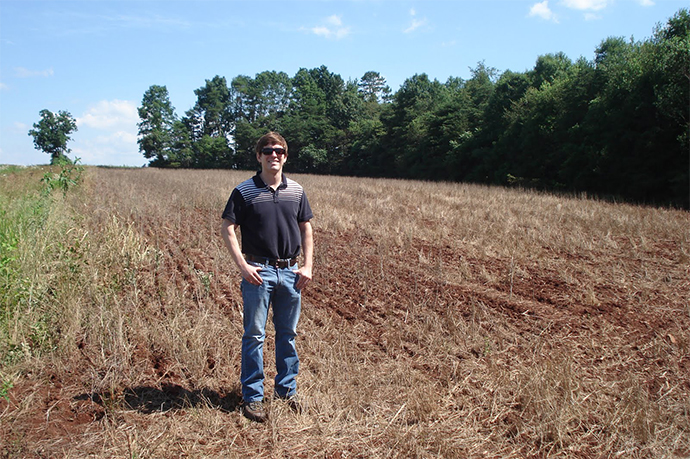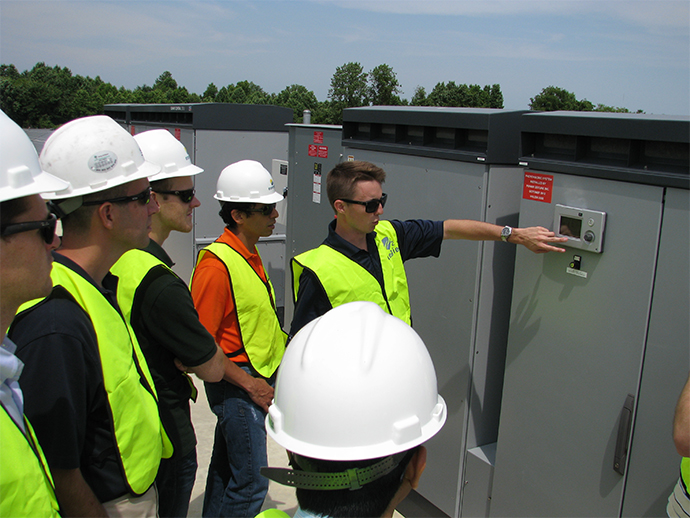While many businesses and industries evaluate their next-generation work force after colleges and universities graduate students, in the Carolinas the energy industry follows another path. The companies engage the students from colleges and universities while they’re still in school. Both can achieve their job goals, and the company can plan for its work force of tomorrow.
The strategic use of internships is a trend that is growing in importance. The old sequence of “wrap up college – interview – go to work” can often include this more direct filter for assessing on-the-job success.
“An internship is the single most important credential for recent college graduates to have on their resume in their job search among all industry segments,” says a report from The Chronicle of Higher Education. The numbers bear this out, as “… 69% percent of companies with 100 or more employees offered full-time jobs to their interns in 2012,” according to Internships.com.
In the energy industry, the Carolinas tap this rich source of work-force development. Approximately 600 of tomorrow’s energy industry work force have been at work in internships and co-op assignments this summer in the Carolinas. This figure is from an inquiry of firms within the network of E4 Carolinas, a two-state energy industry trade association. The companies learn about the students and their potential, and the students learn about prospective career paths.
Carolinas interns range across energy disciplines such as smart grid, nuclear, gas, solar and manufacturing. They also range across career majors such as engineering, IT, human resources, communications, finance, legal and accounting.
With internships, students work inside a company during a regular school term or in the summer as a part of their course of studies. Among the Carolinas energy-oriented companies using interns this summer: ABB, AREVA, ASCO Valve, CB&I, Duke Energy, Energy Solutions, Fluor, GE, Ingersoll-Rand, Kontek Industries, Mesa Associates, Mitsubishi Nuclear Energy Systems, O2 energies, Piedmont Natural Gas, Power Plant Management Services LLC, Savannah River Site, SCANA, SGL Group, Siemens Energy, STEAG Energy Services, Westinghouse, URS Corporation and Zachry.
Real-World Work Helps Combat Real-World Attrition
Internships provide real-world education and a test drive for prospective employees.
“The work schedule and demands of keeping the lights on 24/7 while adhering to the highest standards in safety and performance is not an environment for everyone,” says Debby Hager, manager, strategic workforce development for Duke Energy’s Nuclear Generation Department. “Intern programs allow the company to determine if the student is a potential full-time employee, and for the student to determine if the company is where he or she would like to start a career. This two-directional look is an important component to match students with careers and has proved successful for interns and our company for many years.”
That was the case with Danielle Suprick, who has recently joined Mesa Associates, an engineering services firm located in Fort Mill, S.C. Danielle is a mechanical engineering graduate from UNC Charlotte who interned with Mesa this summer.
“Danielle has quickly become a valuable member of the team. Her willingness and drive to participate in projects has broadened her understanding of engineering applications in the utility market,” says Brandi Reilly, program manager for Mesa. “We fully endorse internships and/or cooperative education to provide real-time experience and knowledge for the younger generation. It is our way to accommodate the brain-drain of Baby Boomers leaving the energy sector and an excellent opportunity to put our best senior employees to work as coaches and mentors.”
Internships are vital as the energy industry faces a work-force development time-crunch. Getting the next wave of employees in place is critical. The Center for Energy Workforce Development says, “…an estimated 46 percent of the work force may need to be replaced by 2015, in large part due to the upcoming waves of Baby Boomers reaching retirement age in the coming years.” That could be some 200,000 skilled workers nationally.
Adding to the challenge is a skills gap among applicants. “Sixty-seven percent of companies are having a hard time filling skilled job positions. Sixty-one percent said the top reason for that was a lack of qualified job applicants,” reports EDTECH Journal. Additionally, the National Center for Education Statistics reports that 70 percent of our nation’s school children are “less than proficient” in science and math.
The skills gap has serious implications. Deficiencies in the basics, such as reading and math, affect shop-floor technical skills and the ability to perform. Our nation has the people, but many people don’t have the skills to do the work that needs to get done. This is a threat to our economic and energy well-being. In the Carolinas, energy companies are taking action.
Models Worth a Closer Look
Siemens Energy in Charlotte, which has hired hundreds of new workers in the past two years, has been cited across the nation for its thorough approach to training and on-boarding manufacturing employees. The company’s partnership with Central Piedmont Community College and the Centralina Workforce Development Board is frequently recognized as an industry best practice.

Casey Davis stands at an oilseed crop field between plantings at the Catawba County EcoComplex Biodiesel Facility near Hickory, N.C., where he interned. Casey drafted the biodiesel fuel piping system for the facility.
“We knew we could find people in the Carolinas with the right aptitude, and further training could develop them into the resources we needed. With the help of our partners, we were able to quickly screen candidates online, then hire and train them to meet our needs,” says Mark Pringle, vice president of the Siemens Charlotte Energy Hub. The manufacturing facility continues to seek machinists and welders for its Gas Turbine operation. Siemens had 25 interns this summer.
SCANA is a Carolinas thought leader in work-force development as it staffs its two new nuclear facilities north of Columbia, S.C., in Fairfield County.
“Interns play an important role in our strategy to create a pool of future employees,” says Scott Macfarland, HR manager at SCANA in Columbia.”One of the measures for success is the number of former interns who get hired full-time when they graduate. Hiring at least 30 percent of your interns is a strong indicator that you are realizing the full strategic value of your program.”
The SCANA nuclear program has a 40-percent hire rate.
Conducting an internship program properly takes planning and must have the right end-game in mind.
“Interns are our primary pipeline for hiring recent college graduates, which is part of our overall strategy for meeting the increased need of early talent hires,” says Nikki Harris, manager of university relations and programs at AREVA, a global company focused on cleaner, safer and more economical solutions for low-carbon power generation.
AREVA announced in March the relocation of its North American headquarters to Charlotte. This summer more than 30 interns and co-op students around the region supported AREVA’s North American operations in a variety of technical and corporate positions.
Successfully on-boarding interns in a company is key. Interns need help to understand the company culture and business practices. Renee Hansen, managing director – talent and performance excellence, Piedmont Natural Gas, says, “Once our interns are selected, each is assigned a buddy — a younger employee who the intern can connect with to ask about things like social events, learning about the city and so on. They also have a mentor who is a more seasoned employee who can often offer career and professional advice.”
“Interns can be a rare opportunity to take a calculated risk on someone who may not be perfect on paper, but seems to have something special to offer.“
— Andrew Collins, director, organizational development, Mitsubishi Nuclear Energy Systems in Charlotte
Piedmont had 11 interns this summer, ranging across such areas as operations, engineering, safety, legal, communications and finance.
Energy companies also tap internships to identify students who may not fit the regular profile but may have a ‘certain something’ to investigate. Andrew Collins, director, organizational development for Charlotte’s Mitsubishi Nuclear Energy Systems, says, “Interns can be a rare opportunity to take a calculated risk on someone who may not be perfect on paper, but seems to have something special to offer. Look for that intangible potential, capacity to learn and the work ethic that can pay significant dividends.”
A company is a mosaic of varied skills and personalities, and internships help verify how the pieces work together. Finding a fit and filling a need are strategic work force issues. A purposeful approach to building a team is critical. One manager says, “I am not the kind of person I need to hire.” To put it in another way, why go for two-of-a-kind when you can draw a flush? Opt for the best hand.
Pragmatic and constructive intern assignments are important.
“It’s incumbent upon us to provide valuable, stretch assignments and experiences. With strong performance, our interns have an opportunity to become our future talent pipelines across the company,” according to Mary Julian, HR manager, engineering, GE Power & Water in Greenville, S.C., where some 60 interns worked this summer.
A Necessary Catalyst for Economic Growth
Building the company brand among upcoming grads is valuable.
“Internship programs serve as outstanding human resources marketing tools. A positive experience with the company gets our name out into the general student market, which in turn gives us a unique insight into what is coming out of the universities,” says Charlotte-based SGL Group’s Joan Espinosa, head of human resources North America.
Collins of Mitsubishi agrees: “If a company creates a seriously tough internship experience, it will quickly gain the reputation that they are the company-of-choice for future leaders to seek.”
A company does not have to be a major multinational enterprise to strategically use interns. Charlotte-based independent power producer O2 energies was developing a 1.2-megawatt solar farm when Logan Stephens, who graduated from the University of North Carolina at Chapel Hill with an environmental science degree, started an internship in March 2011. This project became part of his work.
Stephens was among 13 interns placed in green energy-related businesses by the Center for the Environment at Catawba College. After Stephens’ internship, O2 energies offered him a job in project development and arranged for him to receive the training and be certified by the North American Board of Certified Energy Practitioners in basic solar construction.
“Students want to genuinely participate in the industry, and we in the educational and corporate world must authentically engage with them for success.“
— Lisa Marshall, director of outreach, North Carolina State University
Internships do more than help each company that uses them, however. An ample and well-trained work force is essential for local economic development. Industry needs good workers to thrive. A network of internships can reinforce work-force development and build a regional reputation as a place for young people to relocate and grow.
Here’s an example. A young lady from New York joined the three-week high school summer session called the Young Investigators’ Summer Program in Nuclear Technology at North Carolina State University. Lisa Marshall, director of outreach at NCSU says, “During our program we visited a nuclear plant and had students engage in a slice of our reactor training program. That student afterward enrolled at NCSU and later interned at Progress Energy. Upon graduation she joined the company and is with Duke Energy today.”
This collaborative educational/corporate experience attracted a smart young person to come to our state, stay and contribute to the Carolinas’ economy. Marshall says, “Relationship-building drives a successful intern program from the first contact with students through the recruitment and interview process to job execution and follow-up. Students want to genuinely participate in the industry, and we in the educational and corporate world must authentically engage with them for success.”
Carolinas’ energy companies are stepping up to the plate on this critical jobs issue. Parents have a role, too, to reinforce the path to skilled jobs: Support school efforts to improve STEM education, make science and math knowledge an active part of the home environment and discuss how science and math are used in various careers.
“More and more careers require competencies in science, technology, engineering and math but students are not always aware of these career options,” says Aiken (SC) Technical College Vice President for Education and Training Dr. Gemma Frock. “Through our QuestATC camps and our Scout Saturday workshops we teach young people, in a fun, hands-on environment, what these tech careers are. By engaging not only students, but also parents, to understand and support the value of a STEM education, we can encourage an interest in STEM for future generations and ensure that a highly-trained work force exists to fill the high-demand careers available in our region.”
Internships make a difference. “Nearly two-thirds of graduating seniors from the Class of 2013 took part in an internship or a cooperative education assignment during their years pursuing a bachelor’s degree,” according to a survey by the National Association of Colleges and Employers.

Logan Stephens, at front of the group, interned with Cornelius, N.C.-based O2 energies. Logan is now an important part of the O2 project team that has developed more than $75 million in solar project assets.
E4 Carolinas has various workforce development efforts to strengthen energy education and the professionals in this field. For example, the group is assessing future energy hiring needs in the Carolinas, beginning its work with universities to ensure that company needs and education align, designing special energy training and planning to work with school systems on energy education in K-12 venues. E4 Carolinas also has young leaders classes, a women-in-energy group and an energy communicators group.
Students interested in energy internships are encouraged to start with their university or college internship representative, who can contact me via the E4 Carolinas website.
High rates of internships mean that companies and academia are teaming up wisely. In the Carolinas our intensely collaborative work ethic is a competitive advantage for us in the energy industry. Others may try to imitate it, but we have the innate talent and history to make it work. Young workers appreciate those who genuinely care about professional development, and the energy companies in the Carolinas are collectively developing the work force that can ensure an energy-secure America.
E4 Carolinas is a nonprofit corporation that convenes industry, research and educational institutions, innovators, economic development organizations, and public leaders to coordinate the energy cluster in the Carolinas. E4 Carolinas’ mission is to promote economic growth, employment, productivity and prosperity by cultivating a collaborative energy cluster in the Carolinas region. The four Es stand for Energy, Economy, Environment and Efficiency. Learn more about E4 Carolinas at its website, www.E4Carolinas.org, or contact Scott Carlberg, president, E4 Carolinas at 704-841-7649.
